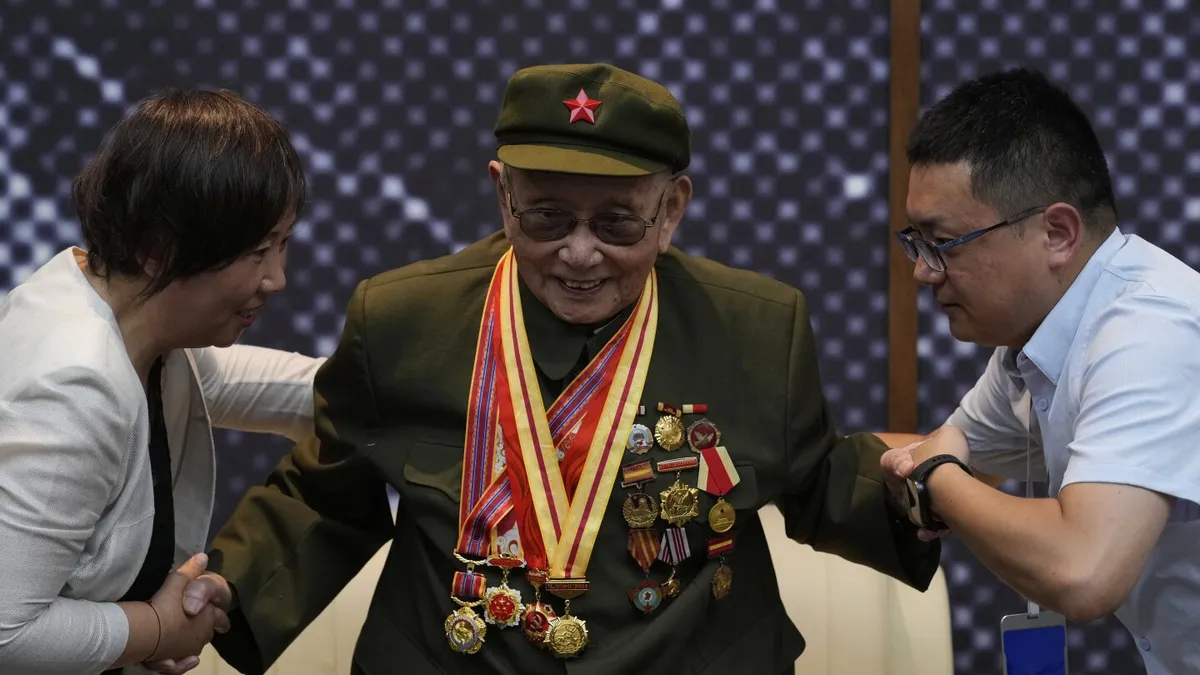
SHENYANG, China (AP) — Yang Huafeng, a 92-year-old veteran of the Chinese army, reflects on a time when the military strength of China was symbolized by troops on horseback and a limited number of planes during the founding of communist China in 1949. This historical backdrop starkly contrasts with the formidable military power that will be showcased in a grand parade celebrating the 80th anniversary of the end of World War II on Wednesday. The devastating effects of the Japanese invasion during the war resulted in millions of casualties in China, a fact that resonates deeply with veterans like Yang.
“Today, when you see our country’s advanced military aircraft, no one dares to challenge us,” Yang proudly stated while speaking to journalists at a war museum located in Shenyang. Adorned with ribbons and medals, he embodies the pride felt by many in China regarding the nation's significant rise in military and global stature. The ruling Communist Party is strategically utilizing this war anniversary to foster national pride through enhanced museums, new war-themed films, and the forthcoming military parade, which will be attended by notable leaders including Vladimir Putin of Russia and Kim Jong Un of North Korea.
The military parade is designed to project strength to international audiences, signaling China's ambition to present itself as a formidable alternative to the current American-dominated global order. On the domestic front, this commemoration aims to illustrate the progress China has made over the years, effectively bolstering support for both the Communist Party and President Xi Jinping. It’s essential to recognize that China played a crucial role in World War II, a narrative that has often been overshadowed by focus on European battles and U.S. naval operations in the Pacific.
“This narrative is pivotal for the Communist Party in legitimizing its role as the leader of the Chinese populace,” explained Emily Matson, a scholar specializing in modern Chinese history at both Georgetown and George Washington Universities.
Historically, the Communist Party did not place significant emphasis on the war's conclusion. After coming to power four years post-war, the Communists largely inherited the legacy of the Nationalist government they overthrew. For decades, the primary focus was on constructing a socialist state rather than commemorating wartime struggles. However, this perception began to shift in 1978 with the initiation of economic reforms that fueled China's rapid growth.
As the country evolved, so did its narrative, transitioning from celebrating the working class to embracing a broader concept of nation-building. Matson notes, “This represents a new form of nationalism, one that encompasses not just the proletariat but the entire Chinese nation.” Over time, the defeat of Japan became an integral part of this narrative, symbolizing the end of a prolonged period of foreign dominance over China.
Under the leadership of Xi Jinping, who took office in 2012, there has been a marked increase in the emphasis on wartime history. Xi's administration has sought to cultivate a robust national identity that resists external pressures and assertiveness. The government has responded to U.S. tariffs and trade disputes with resilience, signaling a strong stance in international relations.
In 2014, the Chinese government officially designated September 3 as Victory Day, commemorating Japan’s formal surrender. The subsequent year marked the first military parade on this date, reflecting the significance of the war's conclusion in the national consciousness. Party historians assert that Japan’s defeat was a transformative moment, laying the groundwork for China’s resurgence as a global power.
For China, the conflict known as the Chinese People’s War of Resistance Against Japanese Aggression began long before the infamous attack on Pearl Harbor in 1941. An extensive exhibition recently opened at a museum near the historic Marco Polo Bridge—a site linked to early skirmishes in 1937 that escalated into a full-scale invasion. The Chinese government has even recalibrated the war's starting point to 1931, when Japan occupied Manchuria.
Visitors to war museums, including the one in Shenyang, encounter artifacts and harrowing images that depict the suffering endured during this turbulent period. Middle school teacher Yan Hongjia, reflecting on the atrocities, drew parallels with contemporary conflicts, asking, “If the children in Gaza were our children, would we choose to endure this history, this humiliation, and this pain?”
As the geopolitical landscape shifts, Harvard historian Rana Mitter emphasizes that the presentation of wartime history in China is evolving. He noted that recent exhibitions highlight the contributions of Soviet pilots who aided China, reflecting the deepening ties between China and Russia. With Putin and Xi scheduled to meet, this relationship is increasingly significant.
Moreover, China's narrative positions itself as a founding member of the United Nations, asserting its role as a defender of the global order amidst challenges posed by U.S. foreign policy. Mitter observes, “World War II is being framed to argue that China is now the rightful heir to the global order established in 1945.”
In the 1940s, the U.S., China, and other allies united against Japan's military expansion in Asia. Fast forward to today, and the dynamics have dramatically changed, with the U.S. and Japan now allied, confronting a more assertive China that some neighboring countries view as a growing threat. Shin Kawashima, a China expert at the University of Tokyo, notes that China is leveraging the military parade to portray itself as a significant player alongside Russia, countering the influence of the United States and other established powers.